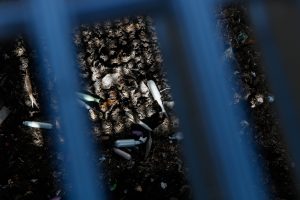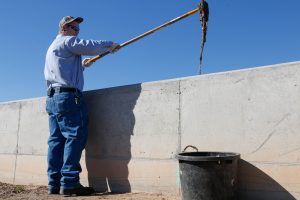- Slug: BC-CNS-Surprise Waste Disposal. 310 words.
- 3 photos and captions below.
- Video here.
By JENNIFER ALVAREZ
Cronkite News
SURPRISE – A $20 bill. A rubber ducky. And grease – lots of grease.
Money, toys and food byproducts clog wastewater systems in Surprise and other cities, costing time, wasting taxpayer dollars and frustrating workers dealing with the errors people flush down the drain, city leaders said.
“We see everything – feminine products, we see rags, flushable wipes. Just because it’s flushable does not mean it’s dissolvable,” said Andrew Johnson, a lead wastewater operator at the South Water Reclamation Facility in Surprise.
Such items also can damage city water pipes and machinery at the treatment plant.
Once unwieldy stuff “gets caught on the equipment, it sort of starts to get tangled with other items,” said Amy Peterson, a wastewater operator at the facility. When all of the unwanted items accumulate, it creates what operators at the facility call ‘rag balls’ that get stuck on equipment. “They can actually burn out motors.”
Damages are expensive, with residents paying for repairs. According to the city, it costs an average of $300,000 every year for maintenance – not including labor – because of improper waste disposal. And that’s just the expense in Surprise. Such costly mistakes, experts said, happen in cities across Arizona and elsewhere in the U.S.
Surprise officials in January kicked off the Be G.R.O.S.S. (Be Guardians Regarding our Sewer System) campaign to educate residents on effects of improper waste disposal.
“Most people probably don’t think about what happens after they flush and by giving them a little picture or a slice of information about how their waste is being processed, we’re hoping that people will just make better decisions,” Peterson said.
This story is part of Elemental: Covering Sustainability, a new multimedia collaboration between Cronkite News, Arizona PBS, KJZZ, KPCC, Rocky Mountain PBS and PBS SoCal.
Follow us on Twitter.
For more stories from Cronkite News, visit cronkitenews.azpbs.org.
^_=


